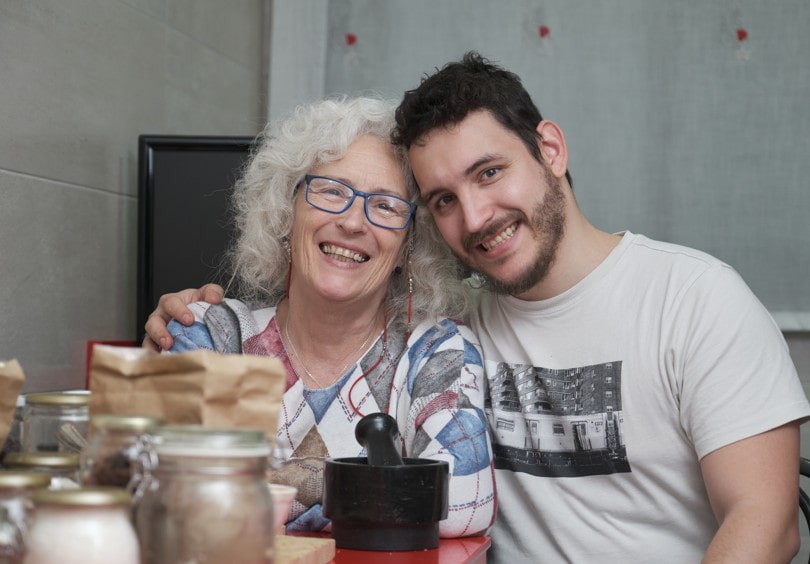Have you ever noticed how a simple touch, a shared memory, or a familiar voice can change someone’s whole day?
That’s not just coincidence—it’s human nature.
We’re wired for connection. It’s how we feel safe, seen, and rooted in who we are. And when someone we love is living with memory loss, that need for connection doesn’t go away. In fact, it becomes even more essential.
Whether your loved one is still at home, or now part of a Memory Care community, your presence continues to shape their sense of belonging, identity, and emotional well-being. It’s not about doing everything—it’s about doing the things that matter most.
💬 Maybe you’re wondering: What can I do to truly support them, even as their memory changes?
This isn’t about grand gestures. It’s about creating small, meaningful moments—ones that offer comfort, clarity, and above all, love.
Let’s walk through some simple, powerful ways to stay present, connected, and supportive—right where they are in their journey.

How Family Presence Can Light the Way in Memory Care
Why Family Support Matters in Dementia Care
Even when a loved one moves into a senior living memory care community, your presence remains one of the most powerful tools in their emotional well-being. Just a few minutes of conversation, holding their hand, or looking through old photos together can ease confusion, reduce anxiety, and even spark recognition.
The Emotional Benefits of Simply Showing Up
Memory care isn’t just about structure and routine—it’s about moments of clarity and connection, and loved ones are at the heart of that. You don’t have to have all the answers. Just showing up, listening, and reassuring them that they’re not alone makes a difference.
🫱🏽🫲🏼 Small Gestures, Big Impact
Simple actions often speak the loudest. Holding hands, brushing their hair, or sitting together in silence can soothe without words.
Try this: Gently offer lotion and give a hand massage while listening to soft music they enjoy. You’re creating sensory safety.
📸 Bring Familiarity Into Focus
Use photos, scents, or treasured items to stimulate memory and create a shared experience. These are known as reminiscence tools in dementia care.
Example: A favorite blanket, the scent of a certain soap, or an old gardening hat can stir up comforting emotions—even if your loved one can’t verbalize them.
👂 Listen to Their Rhythm, Not Just Their Words
Your loved one may repeat themselves, speak less, or express confusion. That’s okay. What matters most is that they feel heard and understood.
Tip: Don’t correct or challenge their version of reality. If they think they’re back in the 1970s, go there with them. Meet them where they are emotionally, not where you want them to be cognitively.
📓 Create a Bridge Between Family and Staff
You’re not just supporting your loved one—you’re supporting their care team, too.
Idea: Keep a simple log of your visits and note what your loved one responds positively to (favorite music, foods, times of day they’re most alert). Share this with staff to help them tailor their care.
Keyword integration: When family and professional caregivers work together in senior care services, outcomes improve dramatically.
❤️ Just Be Present
Even if they don’t remember your name, they’ll remember how you made them feel.
Core reminder: Memory Care isn’t only about managing symptoms—it’s about protecting dignity, fostering peace, and strengthening emotional bonds. And you’re an essential part of that process.
Creating a Comfort Zone: Safety, Nutrition, and Routine Made Personal
Safety in Memory Care: More Than Locked Doors
Creating a truly safe environment in a memory care setting means understanding how dementia affects perception. It’s not only about locks and supervision—it’s about reducing confusion and fostering comfort.
✔️ Tip: Choose low-glare lighting to reduce visual overstimulation and hallucinations, which are common in mid to late-stage dementia.
✔️ Expert Insight: The Alzheimer’s Association recommends contrasting colors on walls, furniture, and floors to help residents better distinguish their surroundings and reduce fall risk.
✔️ Daily Application: Clearly marked spaces and visual cues can support orientation. For example, using pictures or large icons instead of words for room signage can help residents navigate independently.
The Real Impact of Nutrition on Cognitive Health
Nutrition isn’t just about balanced meals—it’s a front-line strategy in slowing cognitive decline and improving overall quality of life.
✔️ Scientific Backing: A 2022 study published in Frontiers in Aging Neuroscience highlights how the MIND diet (a mix of Mediterranean and DASH diets) significantly reduces the risk of Alzheimer’s disease.
✔️ Practical Tip: Incorporate memory-boosting foods like leafy greens, berries, whole grains, and omega-3 rich fish. Avoid processed sugars and saturated fats which can worsen inflammation and cognitive function.
✔️ At Our Community: Meals are more than food—they’re events. We use chef-inspired menus with dementia-friendly presentation (colorful contrast, soft textures, bite-sized portions) and calm mealtimes that encourage independence while offering assistance when needed.
Foods linked to better brainpower
The Role of Routine: Predictability that Soothes
For those living with memory loss, unpredictability can cause stress, anxiety, and disorientation. Personalized routines restore a sense of control and calm.
✔️ What Works: Wake-up times, meals, and bedtime at consistent hours. Repeating structured activities such as music therapy or morning walks help create a dependable rhythm to the day.
✔️ Gentle Guidance: Routines should follow the person’s history and preferences—not just what’s convenient. For instance, if your loved one always loved gardening, a daily check on the community plants can ground them emotionally.
✔️ Family Involvement Tip: Ask the care team if you can be included in the routine—like weekly breakfast visits or story time sessions. Familiarity from loved ones can ease transitions and make routines more meaningful.
Creating a comfort zone is about more than protecting residents—it’s about honoring their identity while supporting their physical and emotional needs in subtle but impactful ways.
Want to see how it all comes to life? Visit our community for expert guidance and a closer look—click here to schedule your visit today!

Building Stronger Days in Memory Care Through Shared Moments
Creating Meaningful Connections in Senior Living Memory Care
In memory care, families often worry about getting everything “right.” But true connection doesn’t require perfection—it only needs presence. Whether it’s sitting together during a meal, listening to music from their youth, or watering plants side by side, it’s these shared rituals that build emotional safety and continuity.
Try this: Instead of correcting a memory, join the moment. If your loved one says something from the past as if it were today, meet them there. For example, if they talk about a long-retired job, ask questions about what they loved about it. This builds connection without causing distress.
Small Acts, Big Impact: Family-Centered Care Tips
Even a short visit can significantly boost emotional well-being. According to the Alzheimer’s Association, regular family interaction can reduce agitation and behavioral symptoms in seniors with dementia.
Ideas to try:
- Bring a familiar item from home, like a soft sweater or a favorite book.
- Eat lunch together in the memory care dining room—sharing meals fosters belonging.
- Create a simple ritual for your visits, like reading a poem or flipping through an old photo album.
These small actions reinforce familiarity and routine, two pillars of effective memory care services. The key is consistency, not perfection.
The Emotional Value of Showing Up in Dementia Care
In a world where time feels stretched and caregiving often feels overwhelming, know this: just being there is enough. Eye contact, a smile, or a gentle touch can calm nerves and help your loved one feel anchored.
Some families hesitate to visit if their loved one doesn’t remember them. But memory care isn’t only about recognition—it’s about emotional memory. Even if names are lost, the feeling of love and comfort remains.
💡 “People may forget what you said, but they’ll never forget how you made them feel.” – Maya Angelou
In memory care, that couldn’t be more true.
Have you seen what our Memory Care has to offer? Click here—you’re going to love it!

What Can You Do When Words Fall Short? A Guide for Being Present in New Ways
How Do You Stay Close When Memory Fades?
When verbal communication becomes harder, many families feel at a loss. But connection doesn’t end where words stop—it simply shifts.
Use sensory anchors: familiar scents, textures, and music can evoke feelings even when memories can’t. Bring a soft sweater they used to wear, play a song they once loved, or sit quietly holding their hand. These actions don’t require conversation—they create comfort.
What Role Can You Play Without Becoming the Caregiver Again?
It’s natural to want to help, fix, or explain—but your role as family is different from staff. And that’s a strength. You’re the face of familiarity, the keeper of inside jokes, the one who knows their laugh before it comes out. Let the care team handle logistics—your job is to bring meaning.
How Can You Support Without Feeling Overwhelmed?
Consistency matters more than length. A 20-minute visit every week can be more impactful than occasional full days. Drop off a handwritten note, join a group event, or schedule a short walk. Sustainable involvement prevents burnout and builds trust with the care team.
💡 Practical Tip: Ask the staff what time of day your loved one is most alert or calm—aligning your visits with their natural rhythm increases the chance of meaningful interaction.
Can Families and Memory Care Staff Be a True Team?
Absolutely. The most successful memory care experiences happen when families and staff work in tandem. Share personal stories, favorite phrases, and preferences—it helps caregivers personalize care and spark recognition.
Remember, memory care is not a replacement for family—it’s an extension of your support.
🤝 Connection in memory care is not about doing more—it’s about doing it with heart and intention. And sometimes, the quietest moments carry the most meaning.
What’s Next? Final Tips for Families Navigating Memory Care with Heart
Dementia may change how your loved one expresses themselves—but it doesn’t erase who they are. As you walk alongside them, here are a few final reminders that can help both of you feel more grounded and connected:
🧠 Stay curious. Their world may look different now, but it still has meaning. Ask open questions, even if the answers surprise you.
🌿 Simplify with dignity. Choose activities they used to love and adapt them—watering plants together or folding towels can be calming and purposeful.
🕰️ Honor their rhythm. Mornings may bring more clarity. Evenings might need more calm. Be flexible with how—and when—you show up.
🤝 Build bridges with caregivers. Share your insights, stories, and observations. The more the team knows, the more personalized their care becomes.
At Oakview Park, we believe that Memory Care services should feel like an extension of your love—not a replacement. From brain fitness programs to chef-inspired meals, from primary care support to community events designed for family connection—we’re here to walk this journey with you.
✨ Want to learn how our Greenville community can support your family’s unique story? [Visit us and discover what truly compassionate memory care looks like.] 👇








